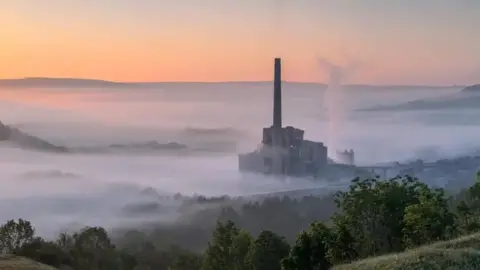BBC News, East Midlands
 Wesley Kristopher
Wesley KristopherA project to develop a pipeline to capture carbon emitted by cement and lime factories in the Peak District and bury it below the Irish Sea will create hundreds of jobs, Chancellor Rachel Reeves has said.
The pipeline will be created to transfer carbon dioxide (CO2) from Derbyshire, Staffordshire and the North West to be stored in the depleted gas fields off the coast of Barrow-in-Furness in Cumbria.
Reeves said the £59.6m project would modernise the cement and lime industry, create jobs and deliver “vital carbon capture infrastructure”.
The government said the Peak Cluster project was the world’s largest cement decarbonisation project, and would create about 300 jobs.
A further 1,200 temporary roles will be created during construction of the pipeline, the government said, while more than 2,000 jobs in cement and lime production will be “supported” by the plan.
In total, the Peak Cluster and Morecambe Net Zero carbon storage projects “could create and secure 13,000 jobs”.
Carbon capture and storage is where CO2 produced from power stations and industrial processes is captured at source, rather than escaping into the atmosphere and adding to global warming.
 Reuters
ReutersPeak Cluster is backed by £28.6m from the government’s National Wealth Fund (NWF), and £31m from private partners including Holcim, Tarmac, Breedon, SigmaRoc, Summit Energy Evolution and Progressive Energy.
She said: “We’re modernising the cement and lime industry, delivering vital carbon capture infrastructure and creating jobs across Derbyshire, Staffordshire and the North West to put more money into working people’s pockets.”
Cement is the modern world’s most common construction material.
But the cement and lime industries are two of the hardest industrial sectors to decarbonise due to the high levels of CO2 emissions generated in the manufacturing process.
Last year, BBC climate editor Justin Rowlatt said if cement was a country, it would be the third biggest source of emissions after China and the US, responsible for 7.5% of human-made CO2.
The Peak Cluster project will prevent more than three million tonnes of CO2 entering the atmosphere each year, the government said.
‘Clean energy transition’
Energy Secretary Ed Miliband said: “This landmark investment will catalyse our carbon capture sector to deliver thousands of highly skilled jobs and growth across our industrial heartlands, as part of our plan for change.
“Workers in the North Sea and Britain’s manufacturing heartlands will drive forward the country’s industrial renewal, positioning them at the forefront of the UK’s clean energy transition.”
The NWF said it would commit at least £5.8bn by 2030 in hydrogen, carbon capture, ports and supply chains, gigafactories and EV [electric vehicle] supply chains, and steel.
John Flint, NWF CEO, said: “Substantial private investment, deployed at risk, will be needed to develop and deliver carbon capture projects across the UK.
“Through its investments, the NWF is well placed to support this, especially in hard to abate sectors such as cement and lime, to ensure a pipeline of projects is ready for deployment and the UK is able to meet its ambitious carbon capture targets.”
John Egan, chief executive of Peak Cluster Ltd, said the plan would help to secure “a sustainable future for the cement and lime industry”, and “benefit communities across the Midlands and North West of England”.






